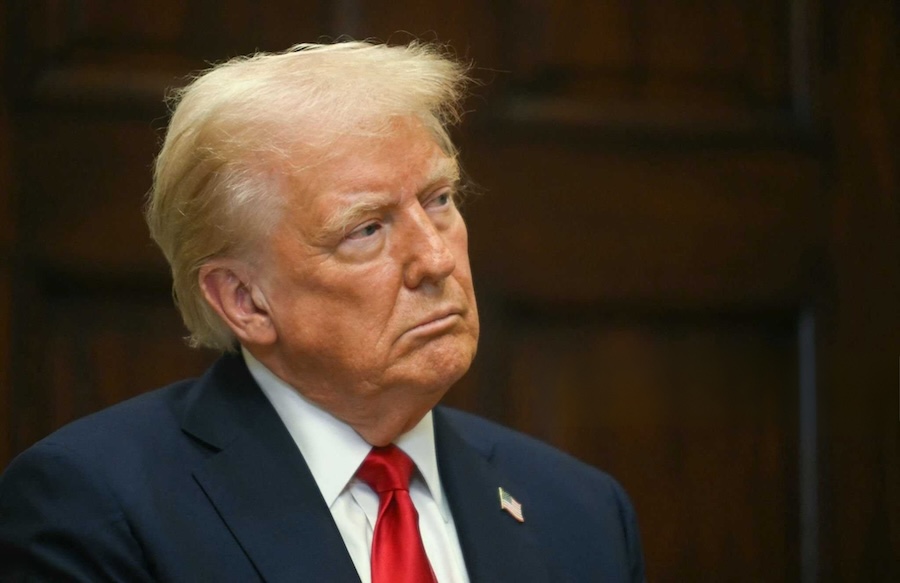Politics
Democrat Congressman Turns On Party, Praises Trump’s Reciprocal Tariffs

A Democratic lawmaker from Maine is voicing early support for President Donald Trump’s new tariff policy, saying the move closely mirrors legislation he introduced earlier this year aimed at reshaping American trade.
Rep. Jared Golden (D-ME), who represents Maine’s 2nd Congressional District, released a statement Wednesday praising the foundation of Trump’s new tariff plan, which includes a 10 percent baseline tariff on nearly all imported goods.
“President Trump has introduced a number of new tariff policies,” Golden said. “What I can say now is I’m pleased the president is building his tariff agenda on the foundation of a universal 10 percent tariff like the one I proposed in the BUILT USA Act. This ring fence around the American economy is a good start to erasing our unsustainable trade deficits.”
Golden emphasized he and his team are still reviewing the details of the administration’s plan but signaled a willingness to work across party lines to address what he calls a “broken ‘free trade’ system.”
“I’m eager to work with the president to fix the broken ‘free trade’ system that made multinational corporations rich but ruined manufacturing communities across the country,” he wrote in a statement.

Washington/USA – January 3, 2019: Rep. Jared Golden (D-ME) and his wife Isobel, arriving at the Capitol for his swearing in to represent Maine’s 2nd congressional district.
Golden introduced the Balance Unequal International Labor and Trade for the United States of America Act—or BUILT USA Act—in January. The legislation proposes a flat 10 percent tariff on all imports into the United States, with adjustments of 5 percent each year depending on whether the U.S. runs a trade surplus or deficit. According to the Congressional Budget Office, the bill could generate $2.2 trillion in revenue through 2034.
“After decades of failed free trade agreements, the hollowing out of American industry and stagnating wages, we owe it to ourselves to ask real questions about what we prioritize in our economy,” Golden said at the time.
The Trump administration’s new trade policy, announced April 2 during a press conference in the White House Rose Garden, introduced a similar 10 percent baseline tariff on imports, with steeper rates for certain countries. Canada and Mexico face 25 percent tariffs under the new framework, while goods from the European Union and Japan face 20 and 24 percent tariffs, respectively.
The White House framed the plan as a broad reset of U.S. trade relationships. While the administration estimates the tariffs could generate $1.8 trillion over the next decade, critics argue the policies could result in higher consumer prices. An analysis projected a 2.1% average reduction in after-tax household incomes.
Golden’s support, even if limited to the structure of the proposal, stands out within his party. Most Democrats have been hesitant to support widespread tariffs, citing concerns over inflation and global trade tensions.
Golden has been critical of past trade deals, voting against the United States-Mexico-Canada Agreement in 2019, calling it “a missed opportunity to deliver real and lasting change.”
In his latest statement, Golden stressed that tariffs should be one piece of a broader strategy. “We need to make sure that the new approach benefits working people — that means supporting unions, the trades and apprenticeship programs, cutting regulations that hold back production, unleashing American energy and using tariff revenue to support domestic manufacturers that create good-paying jobs for Americans,” he said.
Golden also suggested renegotiating existing trade deals to support U.S. producers, citing industries like sawmills, fishermen, and farmers in his district.
“Tariffs are a first step in rewriting a rigged trade system, but they cannot be the last one,” he said.
SUGGESTED VIDEOS FOR YOU
Democrat Rep. LOSES HIS MIND during UNHINGED screaming match on Fox!
Sen. Kennedy SPILLS THE BEANS on Biden’s $2 billion GIFT to Stacey Abrams!
Ex-FBI agent ADMITS THE TRUTH about Biden laptop during Jordan grilling!
“CHECKMATE”; What EVERYONE missed from Trump’s tariff launch!
Amy Klobuchar MELTS DOWN during fiery debate with Ted Cruz!
Help Us ERADICATE The Left Wing Media By Subscribing To Our YouTube Channel!
Subscribe for Daily Reporting on the Trump Administration & Always Receive the Truth!







